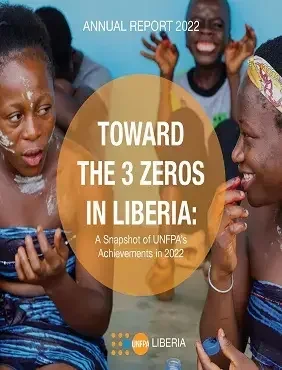UNFPA, the United Nations Population Fund, remains firmly committed to achieving the three transformative results – ending the unmet need for family planning, ending preventable maternal deaths, and ending gender-
based violence and harmful practices, including female genital mutilation (FGM) and teen pregnancy in Liberia by 2030. To do this, we need to accelerate progress and transform how we do business.
As the United Nations’ sexual and reproductive health and rights organisation, our mission is to deliver a world where every pregnancy is wanted, every childbirth is safe, and every young person reaches their full potential.
As we have grown from strength to strength in recent years, UNFPA takes pride in the work we do each day to empower women and young people – in particular, adolescent girls – often under challenging circumstances. Our results speak for themselves. As we near the Sustainable Development 2030 goal post, there are increasing expectations for us to continue to deliver results where it matters the most.
We must intensify our effort to tackle harmful gender norms and inequalities, invest in young people and protect the bodily autonomy of women and girls. At UNFPA we believe that data and evidence underpin all of this, and we must continue to generate data and understand population dynamics and trends in a manner that helps us to assure that all women and men, and girls and boys, enjoy the dignity and human rights to expand their capabilities, secure their reproductive health and rights, find decent work, and contribute to economic growth.
Undoubtedly, the availability of a high-quality population data at national, sectoral, and local levels is crucial to designing and sustaining Liberia’s policy responses and effective development programmes, including macro-economic management, preparation and implementation of poverty reduction programmes, and monitoring programmes towards the Sustainable Development Goals.
In this regard, UNFPA provided technical and financial support to the Government to undertake the 5th National Population and Housing Census. Led by the Liberia Institute of Statistics and Geo-Information Services (LISGIS), the 2022 Census used a state-of-the-art geospatial census monitoring dashboard and Computer Aided Personal Interview (CAPI) technology in all aspects of its implementation. As a comprehensive digital census, it leveraged the available technology to improve operational efficiency and enhance the quality of the data collected. These strategies enabled preempting operation/logistics challenges, remotely monitoring, and reporting fieldwork progress, assessing data quality, and correcting errors and inconsistencies while enumerators were still in the field.
Our efforts to ensure rights and choices for all in Liberia by ending preventable maternal deaths, ending unmet need for family planning, and ending gender-based violence and harmful practices, including child marriage, teen pregnancy, and female genital mutilation, have remained on course.
We continued to adapt, innovate and, working closely with our partners, ensured that our solutions were best suited to the context and need in Liberia, whether it was maternity waiting homes, or SRH and GBV services to At-Risk (substance using) youth.
UNFPA highly values our partnership with the Government of Liberia, civil society organizations, implementing partners, sister UN agencies, and our donors. The progress and results highlighted in this report were only possible with your support.
With strengthened partnership and continued support, we can do more together, and continue to deliver results for the women, girls, and young people of Liberia.


